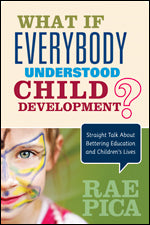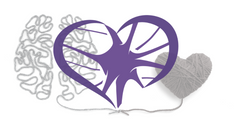In the introduction of her important book, Rae Pica writes:
"... I speculate about how different things might be if everyone understood child development. When I hear stories of small children who are bewildered, frustrated and even defeated in their earliest school experiences, trying with brave determination to do what is asked of them and failing to understand why they can't, I wonder, what if everybody understood child development?"
 This is a great book that is important for EVERY adult to read as the title reflects. Children of course need parents, grandparents, and professionals that interact with them in everyday life to understand development. In addition it is also critical that ANYONE that has an influence on the experiences children have in the critical early years, has a real understanding of how how children develop.
This is a great book that is important for EVERY adult to read as the title reflects. Children of course need parents, grandparents, and professionals that interact with them in everyday life to understand development. In addition it is also critical that ANYONE that has an influence on the experiences children have in the critical early years, has a real understanding of how how children develop.
I had the wonderful opportunity to interview Rae about this exceptionally needed book. It is my hope that you enjoy learning more about the great value of all she has shared.
Deborah:
Your new book is one that I am extremely excited about sharing broadly. Can you share what initially inspired you to write this book?
Rae:
I just got so tired of hearing and reading about all the ridiculous policies and practices that made it clear child development isn’t at the heart of them – and that even seemed to criminalize childhood! For example, the story about the seven-year-old suspended from school for biting his Pop Tart into the shape of a gun. So I wrote a piece for Huffington Post with the title, “What If Everybody Understood Child Development?” and the response was overwhelming. As of today it’s had over 25,000 Facebook likes! That told me that the message resonated. So I started “percolating” on continuing the conversation with a book of similar essays and, two years later, here it is.
Deborah:
And there are many people that are very glad it is here! The book excellently covers a wonderful range of important topics that impact current lives. Even though all of it is critically important, are there areas in which you feel most strongly?
Rae:
There are so many things I find to “rant” about that it’s hard to choose. But probably my “favorite” of the three sections in the book is Part II: Understanding the Mind/Body Connection. Included there is the whole craziness around the belief in a mind/body dichotomy, which results in children being required to sit more and more and more, and the dearth of active learning and play in early childhood and elementary classrooms. And don’t get me started on the elimination of recess – or withholding recess as punishment! If the only part of child development that people understood was the deep connection between mind and body, kids would be better off by leaps and bounds! (Pun intended.)
Deborah:
The format of the book is unique and very considerate of the reader. Would you explain the concept behind the way you designed the book?
Rae:
I wanted something that would be easy to read as well as easy to write. People are so busy these days that it’s difficult to find time for much reading, so I wanted something that wouldn’t overwhelm them. The 29 essays run about 900 to 1300 words in length and can be quickly read whenever time allows, in whatever order preferred. And since I love writing in essay form, it was a win/win!
Deborah:
In the first chapter you wrote about how all children are not the same. It is very fun that you use the analogy of children being unique like snowflakes. I have used that same analogy for many years. Even though this seems incredibly obvious it certainly is not how we treat children in education is it?
Rae:
I don’t know why we can so readily accept the notion that no two snowflakes are alike but struggle with the concept that no two individuals – even of the same age and gender – are alike. I mean, even the parents of twins can tell you that there can be vast differences between the two children.
But, as Jane Healy said to me in a BAM Radio interview, “We have a tendency in this country to put everybody into a formula – to throw them all into the same box and have these expectations that they’re all going to do the same thing at the same time.”
For the most part, that’s always been the case with education: expecting all children in the same grade to master the same work at the same level and pace. But since the inception of No Child Left Behind – and now with Race to the Top and the implementation of the Common Core Standards – it’s only gotten worse. There’s no room anymore for individuality, self-expression, or developmental ranges and differences.
Deborah:
With your deep desire to have things improve for children, what do you hope will occur as a result of people reading your book and everybody understanding child development?
Rae:
Well, I tell the people in my keynotes and trainings that I’m forever in pursuit of utopia – and I suppose that’s what I’m looking for here! If everybody – every parent, educator, administrator, and policymaker – who read my book thought, “Hmmm, maybe she has something there,” and then determined to make all of their decisions regarding children based on a real understanding of children, I’d be a happy camper. And children would be living happier, healthier lives. That’s not too much to ask, is it?
Deborah:
It really is not too much to ask. I have the same dream as do MANY, MANY others. This is obvious by the response to the blog post you mentioned and now the enthusiastic response to your book. Those of us who already understand, need to continue to share information and use our voices, loudly and clearly for the benefit of our children and ultimately everyone in our society. As I frequently say, We ALL benefit when ALL children have well developed brains!
Sincere thanks to you for sharing your thoughts in this interview, but more importantly thank you for sharing your heart and mind in this invaluable book!
[End of Interview]
To Purchase the book, go to:
What If EVERYBODY Understood Child Development?
Rae Pica has been an education consultant specializing in the development and education of the whole child, children's physical activity, and active learning since 1980. A former adjunct instructor with the University of New Hampshire, she is the author of 18 books, including the text Experiences in Movement and Music and the award-winning Great Games for Young Children and Jump into Literacy. Rae has shared her expertise with such groups as the Sesame Street Research Department, the Head Start Bureau, Centers for Disease Control, the President's Council on Physical Fitness and Sports, Nickelodeon's Blue's Clues, Gymboree, Nike, and state health departments throughout the country. She is a member of the executive committee of the Academy of Education Arts and Sciences and is co-founder of BAM Radio Network, where she hosts Teacher’s Aid, interviewing experts in education, child development, play research, the neurosciences, and more. http://www.raepica.com




Be the first to comment